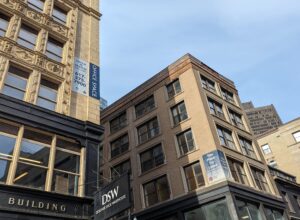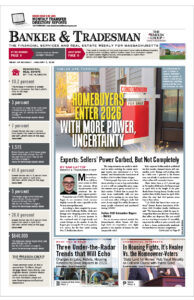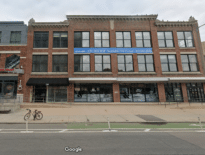
Office buildings with vacant space at the corner of Washington and Bromfield streets in downtown Boston in January 2024. Boston’s office market ended 2023 with a vacancy rate of 15.8 percent, up from 12.5 percent the previous year. Photo by James Sanna | Banker & Tradesman Staff
Speaking to the Boston Municipal Research Bureau’s annual meeting Thursday, Boston Mayor Michelle Wu said her plans to increase troubled office towers’ share of the city’s tax burden were vital to “avoid making our housing crisis worse.”
The mayor has filed a home rule petition with the state legislature asking for permission to increase tax rates on commercial buildings citywide so that, as office towers’ values shrinks with their occupancy rates, residential taxpayers won’t have to make up as much of the difference. Under state law, only around 60 percent of a town or city’s annual property tax haul can come from commercial properties, a level Boston has hit for many years.
“For Boston to become even less affordable would be bad for residents and businesses alike, and I hear all the time from our employers that housing prices are the number-one challenge right now in recruiting and retaining talent,” Wu told the crowd at the Seaport Hotel.
Wu couched her tax plan as part of “careful stewardship of the city budget” that undergirded several applause lines from earlier in her speech, from the city’s remarkably low – and falling – crime rate to the transformation of Boston Public Schools’ Edward M. Kennedy Academy for Health Careers into a primary venue for training the city’s next generation of healthcare and hospital workers.
A report by the Boston Policy Institute and the Tufts University Center for State Policy Analysis estimated the city’s property tax revenues will shrink in the coming years, leaving a $500 million gap by 2029, or around 12 percent of the city’s current budget.
Wu’s plan has come in for significant criticism from real estate interests, with the head of one trade group saying the move is being perceived by some in the industry as “kicking them when they’re down.” If it goes through, NAIOP-MA CEO Tamara Small told CommonWealth Beacon, the plan will drive already-damaged office property values down further.
The Boston mayor noted her administration’s efforts to encourage new development in the city to help grow its way out of any future fiscal problems, including still in-process revamp of the city’s development review process and rezoning efforts in many neighborhood business districts.. Wu’s downtown office-to-residential conversion incentive program has also generated proposals for a little over 200 units across 10 properties to date and the city and the Downtown BID continue to organize events that draw foot traffic downtown and keep the neighborhood lively despite a shortage of office workers – previously retailers’ lifeblood.
Wu defended her decision not to move forward with a tax break for new housing construction, citing an analysis by Harvard University economist and urban affairs expert Ed Glaeser and conversations with many developers about construction costs.
“The truth is, for many housing developments, interest rates will need to come down by 100 to 200 basis points for construction to start. For our tax dollars to get them over that hump in this environment, we would need to forego many years, and in some cases decades, of future tax revenue. At this moment, that isn’t in the best interests of our residents,” she said. “We know how important it is for the city to serve as a partner for clearing as many obstacles as we can to get shovels in the ground on housing production and we’re leaving no stone un-turned.”





